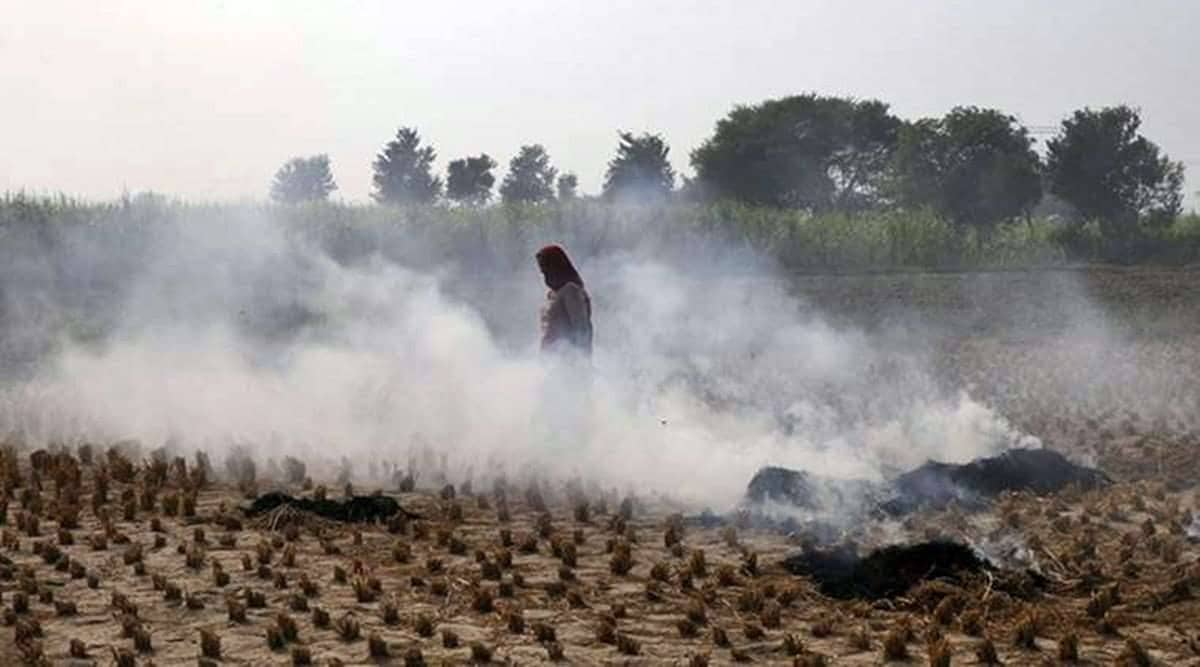 Nodal Officers (NOs), who will work till November 15 -- the end of harvesting season, were supposed to make the farmers aware to the harmful impact of stubble burning. (Representational)
Nodal Officers (NOs), who will work till November 15 -- the end of harvesting season, were supposed to make the farmers aware to the harmful impact of stubble burning. (Representational)A day after advance procurement of paddy began in Punjab on September 27, the state appointed 8,000 nodal officers across villages of Punjab to curb stubble burning. But these nodal officers, as per initial stubble burning trends, seem to have failed in curbing the menace.
There role this season so far has been limited to verifying and reporting the field burning cases to their respective coordinators or cluster officers, rather than preventing stubble burning.
In Punjab, rice harvesting mainly begins from Majha region — Amritsar, Tarn Taran, Gurdaspur, and Pathankot districts — in the second week of September as this region mainly goes for short duration varieties of rice including PUSA 1509, a Basmati variety. This is done to make way for two more crops, vegetables and a late variety of wheat or winter maize.
This is also the reason that stubble fires start from Amritsar and Tarn Taran districts as farmers are in hurry to clear the fields for the next crop.
According to emerging trends, Punjab has reported 1,926 stubble burning cases till Friday out of which 1,427 fires (74 per cent) were reported from Majha including 48 per cent from Amritsar, 21 per cent from Tarn Taran, and 5 per cent from Gurdaspur district. Punjab Pollution Control Board (PPCB) has also imposed ‘environmental compensation’ of worth Rs 12.25 lakh in 460 cases.
According to the PPCB, around a half dozen farmers have been booked for setting their fields on fire. These fires are more than four times higher as compared to the last year when 461 fires were reported during the same period from September 21 to October 9.
In Malwa, there is one district, Patiala,which has reported highest 153 cases to date.
The trends are showing that in Amritsar three blocks — Majithia, Tarsikka and Jandiala Guru — have reported 542 fires out of total 920 of the district, whereas Taran Khadur Sahib and Tarn Taran blocks reported 247 out of 405 fires.
In Patiala too, Pataran block reported 48 out of 153 fires.
“In all these blocks farmers go for vegetable sowing after the paddy harvesting and to clear the fields for the next crop they are burning their fields instead incorporating the stubble in the soil,” said Dr. Anil Sood, head of ACM Division, Punjab Remote Sensing Centre, Ludhiana, adding that this time due to early harvesting because of the early sowing due to Covid and no late rain in September (which used to delay the harvesting), the fires have started showing high trend early as compared to last year.
“These blocks are those blocks where farmers take three crops in a year as they sow mattar (green peas) and potato in September and October, respectively, and after harvesting these in November and December they go for either later variety of wheat or winter maize or ajwaain (celery),” said Chief Agriculture Officer (CAO) Tarn Taran, Dr Kulbir Singh Saini, also having additional charge of CAO Amritsar.
“Vegetable farmers hardly have time to incorporate stubble and they are not ready to spend Rs 3000 extra to incorporate the stubble for preparing field for vegetables,” said an Agriculture Development officer in Amritsar, requesting anonymity, adding that it is important to change the mindset of farmers.
Nodal Officers (NOs), who will work till November 15 — the end of harvesting season, were supposed to make the farmers aware to the harmful impact of stubble burning.
For creating awareness, the NOs were authorised to organise meetings at village level and hand over pamphlets. However, most of the NOs, who are from various government departments including school teachers, agri department employees, cooperation department, rural development, revenue department, Guardian of Governance (GoGs), have limited themselves to verifying, reporting of the field fires with reason on the Action Taken Report (ATR) app of the government.
“My role begins when I get a message from PRSC about a fire in my village and then I go there, verify that whether it is stubble fire or any other fire including fire to garbage of any accidental fire and then after clicking the photos of that I upload it on the App with reasons of fire and then next task is of the coordinator of cluster officer,” said a government school teacher, who is appointed as NO in Tarn Taran, adding that farmers hardly listen to them.
“Government does not want any confrontation with the farmers due to ongoing agitation of the farmers against the three agri Acts passed by the Centre.
The state government does not want that the anger against Centre should take a turn towards them and has asked us to be soft with farmers,” said a senior agriculture officer in Amritsar, adding that farmers only need Rs 2,500 to Rs 3,000 compensation to curb this.
Authorities, meanwhile, maintain that there is nothing to be worried about it as it is just the beginning and the fires will be much less this year by the end of the harvesting.
Punjab has distributed 23,500 stubble management machines this year in addition to 51,000 such machines that were already available in the state till the previous year.
Newly appointed Director, Agriculture Punjab, Rajesh Vashisth neither took calls nor replied to the message sent to him about the role of nodal officers in curbing the burning.
📣 The Indian Express is now on Telegram. Click here to join our channel (@indianexpress) and stay updated with the latest headlines
For all the latest Chandigarh News, download Indian Express App.